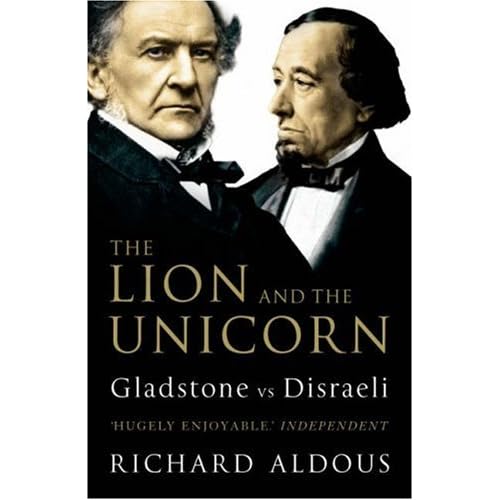
I have just finished reading Richard Aldous's book The Lion and The Unicorn: Gladstone vs. Disraeli. I thought readers of the aggregator might be interested, so here are some comments.
Generally, the book is pretty good, although I would have to admit that, since it is the only book I have read on the subject, I have little to compare it to. Aldous has an easy style which kept me reading during term time (no easy feat, and one which many of my favourite authors have failed to accomplish before now). He likes to open his chapters with little novel-esque scenes to set up the action to follow, which mostly work quite nicely, although the novelty wears off by the end. On the whole, it's a good read, and well worth a look for anyone who, like me, knows comparatively little of their history.
Having said that, a few niggles. It seems to be slightly obsessed with the state of health of its protagonists, at the expense of perhaps more detail about their actual activities in parliament at the time. It came across to me (perhaps wrongly) as having a slightly pro-Disraeli bias. Aldous at times allows the very personal way in which he casts their story to make it sound as if he likes Disraeli better (probably a reasonable judgment, by the sounds of it), and consequently, as if he thinks Disraeli the greater figure. This is not helped in the least by the very cursory treatment which Gladstone's Prime Ministerial career post-Disraeli is given.
I understand that this is a book about the interplay between the two figures, not simply a history, but nevertheless, for someone who doesn't necessarily know the history of the two from anywhere else, I found it genuinely unsatisfying that the period from Disraeli's death in 1881 to Gladstone's in 1898 receives just 6 pages of epilogue, mostly concerned with Gladstone's funeral. After all, three of Glastone's four terms as PM (1868–74, 1880–85, 1886 and 1892–94) fall in this period, and the page or so devoted to discussion of this time can be summed up as carrying the message "oh, yeah, Gladstone was PM for 6 more years, but nothing very exciting happened, and his Reform Act wasn't as good as Disraeli's."
Nevertheless, this is a good piece of historical writing, and worth a look as a much easier way of understanding some of the political interplay that led to the formation of the Conservatives and Liberals out of the Whigs and Tories, and the era which followed, than trying to piece together articles on Wikipedia (the extent of my former understanding of 19th century politics).



No comments:
Post a Comment